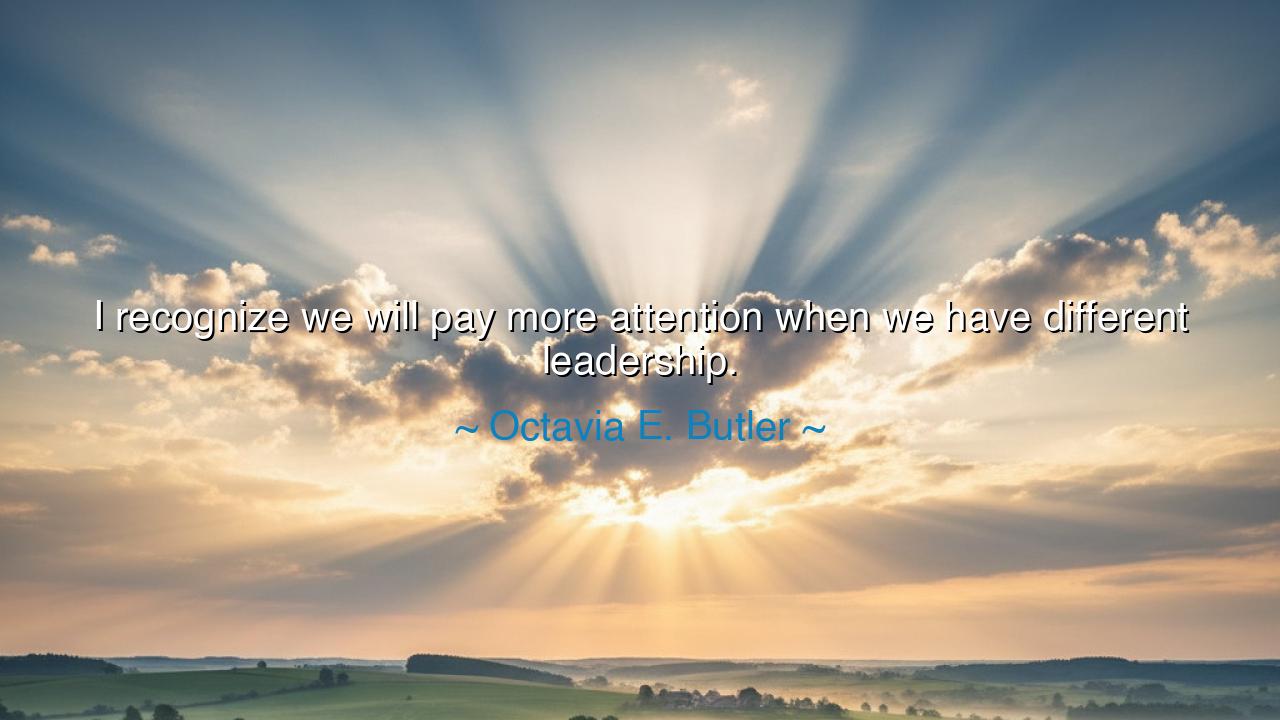
I recognize we will pay more attention when we have different






Hear the words of Octavia E. Butler, the visionary who gazed beyond her time and spoke with the wisdom of a seer: “I recognize we will pay more attention when we have different leadership.” This statement, though simple in its form, carries a weight that speaks across generations. It reminds us that the destiny of peoples often rises or falls upon the shoulders of those who guide them, and that the eyes of the many are opened—or closed—by the voices of the few who command their trust.
To pay attention is no light matter. It is the act of seeing, of listening, of awakening from the slumber of indifference. Yet often the masses remain deaf until a new leadership emerges—one whose vision pierces deeper, whose courage stands taller, whose heart burns brighter with justice. Butler’s words reveal the paradox of humanity: that truth may cry aloud in the wilderness, yet many will not hear it until a new herald calls them forward. Thus, the power of leadership lies not only in ruling, but in awakening.
Consider the story of Abraham Lincoln. For years before his rise, voices cried against the chains of slavery. Many ignored them; many turned away. But when Lincoln came to power, his steady hand and moral clarity gave force to those cries, and a nation began to pay attention to the agony it had long endured in silence. Here is the truth of Butler’s saying: new leadership can awaken a sleeping people, transforming ignorance into action, hesitation into resolve.
History echoes with such moments. Recall the great Mahatma Gandhi, who led India not by sword but by spirit. His people had lived under oppression for centuries, their voices scattered, their hopes dimmed. Yet with his arrival as a different kind of leader, one who wielded nonviolence as his weapon, they began to pay attention—not only to their suffering, but to their power to resist with dignity. Through his leadership, millions arose, and history itself shifted.
Butler’s insight also points to a deeper truth: that not all leaders awaken the best in their people. Some blind the eyes of the masses, turning their attention toward hatred, fear, or distraction. Yet when “different leadership” arises—leadership grounded in compassion, justice, and vision—then the people themselves are transformed. Their attention turns toward what matters: survival, progress, and the building of a more righteous world.
The lesson is clear: do not wait passively for others to awaken your sight. True, a noble leader can inspire, but each person must also cultivate within themselves the discipline of attention. Look closely at the times, discern the truth beneath appearances, and do not let corruption or indifference guide your gaze. For though leadership can awaken the many, the strength of the whole depends on the vigilance of each.
And what actions shall you take? Seek out leaders of vision, and lend them your strength. Do not cling to those who blind you with comfort or lies. Train your mind to question, to notice, to pay attention even when others remain asleep. Be, if need be, the “different leader” within your own circle—guiding friends, families, or communities toward the truths they would otherwise ignore. In this way, you embody Butler’s wisdom, turning her prophecy into practice.
Thus, let these words be carried forward: We will pay more attention when we have different leadership. Yet let us not wait idly for such leaders to appear; let us prepare ourselves, so that when they rise, we are ready to see, ready to hear, ready to act. For attention is the beginning of change, and leadership the fire that kindles it. Together, they shape the future of all humankind.






AAdministratorAdministrator
Welcome, honored guests. Please leave a comment, we will respond soon